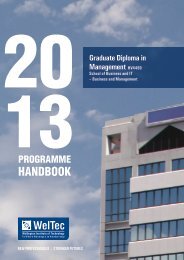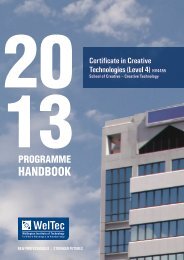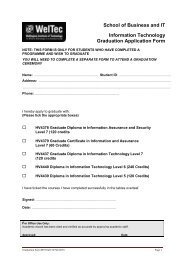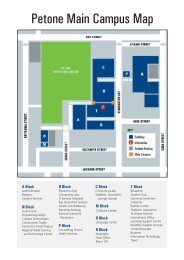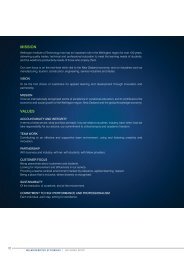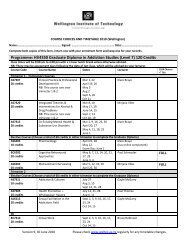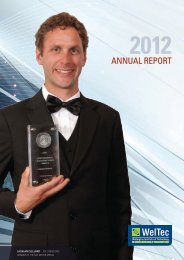1 programme handbook - Wellington Institute of Technology
1 programme handbook - Wellington Institute of Technology
1 programme handbook - Wellington Institute of Technology
Create successful ePaper yourself
Turn your PDF publications into a flip-book with our unique Google optimized e-Paper software.
PROGRAMME<br />
HANDBOOK<br />
Certificate in Supervision<br />
(Human Services) (Level 5) HV4336<br />
School <strong>of</strong> Health and Social Services<br />
– Community Support Services
Disclaimer<br />
<strong>Wellington</strong> <strong>Institute</strong> <strong>of</strong> <strong>Technology</strong> (WelTec) exercises reasonable skill and care to ensure the information contained in this<br />
Programme Handbook is accurate at the time <strong>of</strong> publication. However, <strong>programme</strong>s and courses are subject to continuous<br />
processes <strong>of</strong> review and change and WelTec reserves the right to change the content, location or method <strong>of</strong> presentation <strong>of</strong> any<br />
<strong>programme</strong> or course to reflect changing circumstances including student demand and resource availability, and to update this<br />
Programme Handbook accordingly. The online edition <strong>of</strong> the Programme Handbook is the <strong>of</strong>ficial Programme Handbook.<br />
WelTec accepts no responsibility or liability for errors or omissions that may be contained in this Programme Handbook, nor any<br />
consequences arising therefrom.<br />
Copyright © 2013<br />
WelTec owns copyright in this <strong>programme</strong> <strong>handbook</strong>. No part may be reproduced, stored in a retrieval system or <strong>of</strong>fered for<br />
resale without WelTec’s written permission. Contact WelTecHandbook@weltec.ac.nz for more information.<br />
<strong>Wellington</strong> <strong>Institute</strong> <strong>of</strong> <strong>Technology</strong> - 2013 Programme Handbook July 2013<br />
HV4336 Certificate in Supervision (Human Services) (Level 5)
School <strong>of</strong> Health and Social Services<br />
PROGRAMME HANDBOOK 2013<br />
HV4336<br />
Certificate in Supervision (Human<br />
Services) (Level 5)<br />
<strong>Wellington</strong> <strong>Institute</strong> <strong>of</strong> <strong>Technology</strong> - 2013 Programme Handbook<br />
HV4336 Certificate in Supervision (Human Services) (Level 5)<br />
Publication Date: 8 July 2013
HAERE MAI<br />
Whai korōria ki te atua i runga rawa<br />
Maunga rongo ki te whenua<br />
Whakaaro pai ki ngā Tangata Katoa.<br />
Tena Koutou Katoa,<br />
Tēnei te mihi atu ki a koutou ngā Tauira o<br />
Te Whare Wananga o Te Awakairangi.<br />
Nau mai haere mai ki tēnei Wananga o tātou.<br />
Kia kaha koutou ki te whai mātauranga i tēnei tau, ki te whakarongo<br />
hoki ki ō koutou kaiako.<br />
“Whāia te kotahitanga o te wairua.<br />
Mā te rangimārie me te aroha e paihere”<br />
(pursue unity <strong>of</strong> spirit, which is bound together by peace and aroha)<br />
He mihi nui tēnei kia koutou ngā Tauira o<br />
Te Whare Wananga o Te Awakairangi.<br />
Nau mai haere mai ki tēnei Whare Wananga o tātou.<br />
<strong>Wellington</strong> <strong>Institute</strong> <strong>of</strong> <strong>Technology</strong> - 2013 HV4336 Programme Handbook July 2013<br />
Overview and Programme Specific Information Page 4
CONTENTS<br />
HAERE MAI............................................................................................................................................. 4<br />
CHIEF EXECUTIVE’S WELCOME ......................................................................................................... 6<br />
EXECUTIVE DEAN’S WELCOME .......................................................................................................... 7<br />
INTRODUCTION ..................................................................................................................................... 7<br />
ACADEMIC CALENDAR - 2013 ............................................................................................................. 8<br />
STAFF ................................................................................................................................................... 14<br />
GRADUATE PROFILE .......................................................................................................................... 14<br />
STAIRCASING ...................................................................................................................................... 14<br />
GRADUATION CRITERIA .................................................................................................................... 15<br />
LEARNING AND TEACHING................................................................................................................ 15<br />
ASSESSMENT PROCEDURES ........................................................................................................... 15<br />
Assessment Rationale ................................................................................................................ 16<br />
Assessment Schedule ................................................................................................................ 16<br />
Assessment Cover Sheets ......................................................................................................... 16<br />
Submitting Assessment And Assignment Work ......................................................................... 16<br />
Arranging for Late Submission Of Assessments ........................................................................ 17<br />
Applying For An Extension Beyond The Course End Date ........................................................ 17<br />
Penalty for Unarranged Late Submission ................................................................................... 17<br />
Reassessment Of Assessments ................................................................................................. 17<br />
Assessment Results Notification ................................................................................................ 17<br />
Challenging Assessment Decisions ............................................................................................ 17<br />
RISK MANAGEMENT, SAFETY AND HEALTH ................................................................................... 18<br />
ATTENDANCE MATTERS .................................................................................................................... 18<br />
PERSONAL EQUIPMENT AND MATERIALS ...................................................................................... 18<br />
REQUIRED TEXTS ............................................................................................................................... 18<br />
STATIONERY REQUIREMENTS ......................................................................................................... 18<br />
OFF-SITE PRACTICAL AND WORKPLACE COMPONENTS ............................................................. 19<br />
ETHICS ................................................................................................................................................. 19<br />
INFORMED CONSENT AND CONFIDENTALITY................................................................................ 19<br />
PROGRAMME EVALUATION .............................................................................................................. 19<br />
COURSE DESCRIPTORS .................................................................................................................... 20<br />
<strong>Wellington</strong> <strong>Institute</strong> <strong>of</strong> <strong>Technology</strong> - 2013 HV4336 Programme Handbook July 2013<br />
Overview and Programme Specific Information Page 5
WELCOME TO WELTEC<br />
CHIEF EXECUTIVE’S WELCOME<br />
Greetings, Kia Ora, Tal<strong>of</strong>a Lava, Kia Orana, ni sa Bula Vinaka<br />
Kaise Hai, Sat sri akal, Malo e Lelei, Halo Olgeta, Taloha ni<br />
Marhaba, Bozu, Fakal<strong>of</strong>a Lahi Atu, Annyong haseyo, Ni hao, Namaste<br />
Welcome to <strong>Wellington</strong> <strong>Institute</strong> <strong>of</strong> <strong>Technology</strong><br />
Te Whare Wananga o te Awakairangi<br />
In selecting to learn at <strong>Wellington</strong> <strong>Institute</strong> <strong>of</strong> <strong>Technology</strong> (WelTec), you have chosen a place <strong>of</strong><br />
learning that aims to give you not only the working lifestyle you want, but also, a friendly and<br />
comfortable environment where you can feel at home.<br />
By enrolling at WelTec, you are setting out on a learning journey. What you learn and for what<br />
purpose, are your decisions to make. We want to walk beside you as your coach, partner and<br />
mentor; <strong>of</strong>fering support, facilities, opportunities, tools and information to help you reach your<br />
goals.<br />
When you enrol, you will find that the majority, or maybe all, <strong>of</strong> your courses take place on one<br />
campus. Whether your classes are held at our <strong>Wellington</strong> sites, in Auckland, Christchurch, any <strong>of</strong> our<br />
Petone or other sites, all are your campuses.<br />
With your Student ID card, all services and facilities are there for you to use.<br />
Please let us know if you have any queries or needs we haven’t yet met. Best wishes for a happy and<br />
successful year.<br />
Linda Sissons (Dr)<br />
Chief Executive<br />
<strong>Wellington</strong> <strong>Institute</strong> <strong>of</strong> <strong>Technology</strong> - 2013 HV4336 Programme Handbook July 2013<br />
Overview and Programme Specific Information Page 6
EXECUTIVE DEAN’S WELCOME<br />
Welcome to WelTec – your place for learning. As an institute <strong>of</strong> learning you, as a student, are our<br />
key priority.<br />
All staff at WelTec have one primary focus and that is to help facilitate your learning. As you<br />
progress through your studies please take the opportunity to access the facilities and staff support<br />
available.<br />
Your success is our success.<br />
Julia Hennessy (MEd, MMgt, PGDipHSM, BA, DipN)<br />
Executive Dean<br />
INTRODUCTION<br />
This Programme Handbook is intended to provide information relating to the <strong>programme</strong> you<br />
are enrolled in with WelTec. There is also an associated WelTec A-Z site that has other<br />
helpful information regarding systems and processes that operate at WelTec.<br />
The most up-to-date version <strong>of</strong> this Programme Handbook and the WelTec A-Z general<br />
information is online at:<br />
http://www.weltec.ac.nz/SH/<strong>programme</strong>/HV4336.pdf<br />
WelTec’s policies that apply to students and this Programme Handbook are located at:<br />
http://www.weltec.ac.nz/SH/Generic/POLICIES.pdf<br />
If you find any errors, or have suggestions for improvements this Programme Handbook,<br />
please send your thoughts to the Programme Handbook team at:<br />
WelTecHandbook@weltec.ac.nz<br />
If you find any errors, or have suggestions for improvements the WelTec A-Z Handbook<br />
sections, please send your thoughts to the A-Z team at:<br />
WelTecA-Z@weltec.ac.nz<br />
<strong>Wellington</strong> <strong>Institute</strong> <strong>of</strong> <strong>Technology</strong> - 2013 HV4336 Programme Handbook July 2013<br />
Overview and Programme Specific Information Page 7
TRIMESTER ONE 2013<br />
TRIMESTER TWO 2013<br />
ACADEMIC CALENDAR - 2013<br />
HV4336 Certificate in Supervision - <strong>Wellington</strong> Church Street Campus<br />
Teaching<br />
Period<br />
Week<br />
No<br />
Monday<br />
date<br />
5 28-Jan<br />
MON TUE WED THU FRI SAT SUN<br />
Auckland<br />
Anniversary<br />
6 4-Feb Waitangi Day<br />
7 11-Feb<br />
8 18-Feb<br />
9 25-Feb<br />
Orientation<br />
Trades<br />
Academy (1)<br />
Mihi<br />
Whakatau;<br />
Orientation<br />
Petone<br />
10 4-Mar Tri 1 Starts<br />
Orientation<br />
Maori<br />
Students<br />
Orientation<br />
Church St,<br />
Cuba St<br />
<strong>Wellington</strong><br />
Orientations:<br />
Auckland;<br />
Trades<br />
Academy (2)<br />
Orientation<br />
Petone<br />
Orientation<br />
Auckland<br />
International<br />
Orientation<br />
Petone<br />
Orientations:<br />
Christchurch;<br />
Youth<br />
Guarantee<br />
11 11-Mar Tri 1 <br />
12 18-Mar<br />
13 25-Mar Tri 1+2 Easter Break<br />
14 1-Apr Easter Break Easter Break <br />
15 8-Apr<br />
Easter<br />
Break<br />
Easter<br />
Break<br />
16 15-Apr<br />
17 22-Apr ANZAC Day<br />
18 29-Apr<br />
19 6-May<br />
20 13-May<br />
21 20-May<br />
22 27-May<br />
23 3-Jun<br />
24 10-Jun<br />
25 17-Jun<br />
Queen’s<br />
Birthday<br />
Tri 1 <br />
26 24-Jun Tri 1 Ends<br />
27 1-Jul<br />
28 8-Jul<br />
29 15-Jul Tri 2 Starts<br />
Tri 1 Results<br />
Completed<br />
30 22-Jul Tri 2 <br />
31 29-Jul Tri 1+2 <br />
32 5-Aug Tri 2+3 <br />
33 12-Aug<br />
34 19-Aug<br />
Graduation<br />
<strong>Wellington</strong><br />
35 26-Aug<br />
36 2-Sep<br />
37 9-Sep<br />
38 16-Sep<br />
39 23-Sep<br />
<strong>Wellington</strong> <strong>Institute</strong> <strong>of</strong> <strong>Technology</strong> - 2013 HV4336 Programme Handbook July 2013<br />
Overview and Programme Specific Information Page 8
TRIMESTER THREE – 2013<br />
Teaching<br />
Period<br />
Week<br />
No<br />
Monday<br />
date<br />
40 30-Sep<br />
41 7-Oct<br />
MON TUE WED THU FRI SAT SUN<br />
42 14-Oct Tri 2 <br />
43 21-Oct<br />
44 28-Oct Labour Day<br />
45 4-Nov Tri 2 Ends<br />
46 11-Nov Tri 3 Starts<br />
47 18-Nov<br />
48 25-Nov<br />
Canterbury<br />
Anniversary<br />
Tri 2<br />
Tri2 Results<br />
Completed<br />
49 2-Dec<br />
50 9-Dec<br />
51 16-Dec<br />
52 23-Dec WelTec closed for Christmas<br />
1<br />
30-Dec-<br />
13<br />
2 6-Jan-14<br />
3 13-Jan<br />
Tri 2+3 <br />
4 20-Jan<br />
5 27-Jan<br />
<strong>Wellington</strong><br />
Anniversary<br />
Auckland<br />
Anniversary<br />
WelTec closed for New Year Holidays<br />
6 3-Feb<br />
Tri 3 Waitangi Day<br />
7 10-Feb<br />
8 17-Feb<br />
9 24-Feb Tri 3 Ends<br />
10 3-Mar Tri 1 Starts<br />
11 10-Mar<br />
Tri 3 Results<br />
Completed<br />
Enr period Last date to change or withdraw in that enrolment period with refund<br />
Enr period<br />
Last date to withdraw (75% <strong>of</strong> course enrolment period)<br />
<strong>Wellington</strong> <strong>Institute</strong> <strong>of</strong> <strong>Technology</strong> - 2013 HV4336 Programme Handbook July 2013<br />
Overview and Programme Specific Information Page 9
TRIMESTER ONE 2013<br />
TRIMESTER TWO 2013<br />
HV4336 Certificate in Supervision - Auckland Campus<br />
Teaching<br />
Period<br />
Week<br />
No<br />
Monday<br />
date<br />
5 28-Jan<br />
MON TUE WED THU FRI SAT SUN<br />
Auckland<br />
Anniversary<br />
6 4-Feb Waitangi Day<br />
7 11-Feb<br />
Orientation<br />
Trades<br />
Academy (1)<br />
8 18-Feb Tri 1 Starts<br />
9 25-Feb<br />
10 4-Mar<br />
Mihi<br />
Whakatau;<br />
Orientation<br />
Petone<br />
Orientation<br />
Maori<br />
Students<br />
Orientation<br />
Church St,<br />
Cuba St<br />
<strong>Wellington</strong><br />
Orientations:<br />
Auckland;<br />
Trades<br />
Academy (2)<br />
Orientation<br />
Petone<br />
Orientation<br />
Auckland<br />
International<br />
Orientation<br />
Petone<br />
Orientations:<br />
Christchurch;<br />
Youth<br />
Guarantee<br />
11 11-Mar Tri 1 <br />
12 18-Mar<br />
13 25-Mar Tri 1+2 Easter Break<br />
14 1-Apr Easter Break Easter Break <br />
15 8-Apr<br />
Easter<br />
Break<br />
Easter<br />
Break<br />
16 15-Apr<br />
17 22-Apr ANZAC Day<br />
18 29-Apr<br />
19 6-May<br />
20 13-May<br />
21 20-May<br />
22 27-May<br />
23 3-Jun<br />
Queen’s<br />
Birthday<br />
Tri 1 <br />
24 10-Jun Tri 1 Ends<br />
25 17-Jun<br />
26 24-Jun<br />
27 1-Jul<br />
28 8-Jul<br />
29 15-Jul<br />
Tri 2 Starts<br />
Tri 1 Results<br />
Completed<br />
30 22-Jul Tri 2 <br />
31 29-Jul Tri 1+2 <br />
32 5-Aug Tri 2+3 <br />
33 12-Aug<br />
34 19-Aug<br />
Graduation<br />
<strong>Wellington</strong><br />
35 26-Aug<br />
36 2-Sep<br />
37 9-Sep<br />
38 16-Sep<br />
39 23-Sep<br />
40 30-Sep<br />
41 7-Oct<br />
<strong>Wellington</strong> <strong>Institute</strong> <strong>of</strong> <strong>Technology</strong> - 2013 HV4336 Programme Handbook July 2013<br />
Overview and Programme Specific Information Page 10
TRIMESTER THREE – 2013<br />
42 14-Oct Tri 2 <br />
43 21-Oct<br />
44 28-Oct Labour Day<br />
Tri 2 Ends<br />
45 4-Nov<br />
46 11-Nov<br />
47 18-Nov<br />
48 25-Nov<br />
49 2-Dec<br />
Tri 3 Starts<br />
Canterbury<br />
Anniversary<br />
Tri 2<br />
Tri2 Results<br />
Completed<br />
50 9-Dec<br />
51 16-Dec<br />
52 23-Dec WelTec closed for Christmas<br />
1<br />
30-Dec-<br />
13<br />
2 6-Jan-14<br />
3 13-Jan<br />
Tri 2+3 <br />
4 20-Jan<br />
5 27-Jan<br />
<strong>Wellington</strong><br />
Anniversary<br />
Auckland<br />
Anniversary<br />
WelTec closed for New Year Holidays<br />
6 3-Feb<br />
Tri 3 Waitangi Day<br />
7 10-Feb<br />
8 17-Feb Tri 1 Starts<br />
9 24-Feb Tri 3 Ends<br />
10 3-Mar<br />
11 10-Mar<br />
Tri 3 Results<br />
Completed<br />
Enr period Last date to change or withdraw in that enrolment period with refund<br />
Enr period<br />
Last date to withdraw (75% <strong>of</strong> course enrolment period)<br />
<strong>Wellington</strong> <strong>Institute</strong> <strong>of</strong> <strong>Technology</strong> - 2013 HV4336 Programme Handbook July 2013<br />
Overview and Programme Specific Information Page 11
TRIMESTER ONE 2013<br />
TRIMESTER TWO 2013<br />
HV4336 Certificate in Supervision - Christchurch Campus<br />
Teaching<br />
Period<br />
Week<br />
No<br />
Monday<br />
date<br />
5 28-Jan<br />
MON TUE WED THU FRI SAT SUN<br />
Auckland<br />
Anniversary<br />
6 4-Feb Waitangi Day<br />
7 11-Feb<br />
Orientation<br />
Trades<br />
Academy (1)<br />
8 18-Feb Tri 1 Starts<br />
9 25-Feb<br />
10 4-Mar<br />
Mihi<br />
Whakatau;<br />
Orientation<br />
Petone<br />
Orientation<br />
Maori<br />
Students<br />
Orientation<br />
Church St,<br />
Cuba St<br />
<strong>Wellington</strong><br />
Orientations:<br />
Auckland;<br />
Trades<br />
Academy (2)<br />
Orientation<br />
Petone<br />
Orientation<br />
Auckland<br />
International<br />
Orientation<br />
Petone<br />
Orientations:<br />
Christchurch;<br />
Youth<br />
Guarantee<br />
11 11-Mar Tri 1 <br />
12 18-Mar<br />
13 25-Mar Tri 1+2 Easter Break<br />
14 1-Apr Easter Break Easter Break <br />
15 8-Apr<br />
Easter<br />
Break<br />
Easter<br />
Break<br />
16 15-Apr<br />
17 22-Apr ANZAC Day<br />
18 29-Apr<br />
19 6-May<br />
20 13-May<br />
21 20-May<br />
22 27-May<br />
23 3-Jun<br />
Queen’s<br />
Birthday<br />
Tri 1 <br />
24 10-Jun Tri 1 Ends<br />
25 17-Jun<br />
26 24-Jun<br />
27 1-Jul<br />
28 8-Jul<br />
29 15-Jul<br />
Tri 2 Starts<br />
Tri 1 Results<br />
Completed<br />
30 22-Jul Tri 2 <br />
31 29-Jul Tri 1+2 <br />
32 5-Aug Tri 2+3 <br />
33 12-Aug<br />
34 19-Aug<br />
Graduation<br />
<strong>Wellington</strong><br />
35 26-Aug<br />
36 2-Sep<br />
37 9-Sep<br />
38 16-Sep<br />
39 23-Sep<br />
40 30-Sep<br />
41 7-Oct<br />
<strong>Wellington</strong> <strong>Institute</strong> <strong>of</strong> <strong>Technology</strong> - 2013 HV4336 Programme Handbook July 2013<br />
Overview and Programme Specific Information Page 12
TRIMESTER THREE – 2013<br />
42 14-Oct Tri 2 <br />
43 21-Oct<br />
44 28-Oct Labour Day<br />
Tri 2 Ends<br />
45 4-Nov<br />
46 11-Nov<br />
47 18-Nov<br />
48 25-Nov<br />
49 2-Dec<br />
Tri 3 Starts<br />
Canterbury<br />
Anniversary<br />
Tri 2<br />
Tri2 Results<br />
Completed<br />
50 9-Dec<br />
51 16-Dec<br />
52 23-Dec WelTec closed for Christmas<br />
1<br />
30-Dec-<br />
13<br />
2 6-Jan-14<br />
3 13-Jan<br />
Tri 2+3 <br />
4 20-Jan<br />
5 27-Jan<br />
<strong>Wellington</strong><br />
Anniversary<br />
Auckland<br />
Anniversary<br />
WelTec closed for New Year Holidays<br />
6 3-Feb<br />
Tri 3 Waitangi Day<br />
7 10-Feb<br />
8 17-Feb Tri 1 Starts<br />
9 24-Feb Tri 3 Ends<br />
10 3-Mar<br />
11 10-Mar<br />
Tri 3 Results<br />
Completed<br />
Enr period Last date to change or withdraw in that enrolment period with refund<br />
Enr period<br />
Last date to withdraw (75% <strong>of</strong> course enrolment period)<br />
The up-to-date, day-to-day and week-by-week timetables are located at:<br />
http://timetable.weltec.ac.nz/.<br />
<strong>Wellington</strong> <strong>Institute</strong> <strong>of</strong> <strong>Technology</strong> - 2013 HV4336 Programme Handbook July 2013<br />
Overview and Programme Specific Information Page 13
STAFF<br />
Executive Dean:<br />
Julia Hennessy<br />
School:<br />
Health and Social Services<br />
Head <strong>of</strong> School:<br />
MaryLou Sloane<br />
E-mail:<br />
marylou.sloane@weltec.ac.nz<br />
Associate Head <strong>of</strong> School: Mumtaz Dalwai (Auckland)<br />
Wendy Roberts (<strong>Wellington</strong>)<br />
Phone: Mumtaz: 0-9-950 2600<br />
Wendy: 0-4-830 2006<br />
E-mail:<br />
Mumtaz.Dalwai@weltec.ac.nz<br />
Wendy.Roberts@weltec.ac.nz<br />
Staff Member Qualifications Position Email Address<br />
Auckland Campus: 0800 WELTEC (935 832)<br />
DALWAI, Mumtaz BCom (Hons) Associate Mumtaz.dalwai@weltec.ac.nz<br />
Head <strong>of</strong><br />
School<br />
ALEXIS, Norma MHSc, GradDipPsychSoc, ASM<br />
Norma.alexis@weltec.ac.nz<br />
CertA&DCouns,CertSuperv<br />
CAI, Cindy MBA Business Cindy.cai@weltec.ac.nz<br />
Administrator<br />
VAN, Janet<br />
Business<br />
Administrator<br />
Janet.van@weltec.ac.nz<br />
Position Abbreviations:<br />
ASM Academic Staff Member SASM Senior ASM PASM Principal ASM<br />
GRADUATE PROFILE<br />
Graduates will have the skills to:<br />
• Discuss their theoretical approach to supervision<br />
• Use a model <strong>of</strong> supervision to structure a supervision session<br />
• Use supervisory skills that facilitate competence and reflective practice in supervisees<br />
• Identify and address potential safety and ethical issues within a supervision session.<br />
• Use ethical principles to guide supervisory practice<br />
• Use contracts to guide supervisory practice<br />
• Demonstrate the skills <strong>of</strong> a reflective practitioner<br />
• Maintain clear records and documents for supervision sessions.<br />
STAIRCASING<br />
Students who successfully complete the Certificate in Supervision (Human Services) Level 5<br />
will be able to continue their pathway <strong>of</strong> learning into the proposed higher qualification, the<br />
Advanced Certificate in Supervision (Human Services) (Level 6).<br />
<strong>Wellington</strong> <strong>Institute</strong> <strong>of</strong> <strong>Technology</strong> - 2013 HV4336 Programme Handbook July 2013<br />
Overview and Programme Specific Information Page 14
GRADUATION CRITERIA<br />
The Certificate in Supervision (Human Services) is considered equivalent to level 5 on the<br />
NZQA National Framework and is awarded on the successful completion <strong>of</strong> the 40 credit<br />
<strong>programme</strong>.<br />
LEARNING AND TEACHING<br />
Lectures – Introduces new concepts.<br />
Assignments – provides for student feedback.<br />
Tutorials – Allows for sharing ideas and knowledge and apply theory to practice.<br />
Case Studies, Group and student activities/presentations – supports collaborative learning.<br />
Practice Sessions – Mirrors real supervision situations in a safe setting.<br />
Self Directed learning – Allows for self-directed learning and provides opportunities to select<br />
own learning focus and implement lifelong learning skills.<br />
Reflective practice – provides the opportunity for individual understandings to be surfaced,<br />
understood and reformulated.<br />
ASSESSMENT PROCEDURES<br />
You need to become familiar with the assessment procedures for your courses and this<br />
Programme. Overall Programme procedures are given below. There may also be course<br />
specific assessment procedures and requirements noted in your Course Outlines.<br />
Please note that all activities that contribute towards your final course grades, and therefore<br />
your qualification completion, are known as assessments (summative assessments to be<br />
precise). There are many different types <strong>of</strong> assessment activities your tutors use in your<br />
courses.<br />
The WelTec Academic Regulations section 7 require that you:<br />
<br />
<br />
make yourself available to undertake all summative assessment items at the time<br />
and place stipulated by the teaching staff responsible for the course<br />
act with integrity (honesty) during assessments. You are expected to:<br />
o Submit material that is your own original work<br />
o Collaborate only as permitted<br />
o Acknowledge contributions from other sources by using APA reference format<br />
(failure to do this correctly may be regarded as plagiarism)<br />
o Keep written and electronic work secure to prevent others from accessing and<br />
copying work<br />
o Understand the definition <strong>of</strong> academic dishonesty and the consequences <strong>of</strong><br />
breaching the regulations (see Academic Regulations S12 Dishonest Practice).<br />
WelTec conducts assessments within rules set out in the following regulations and policies:<br />
The Academic Regulations 2013<br />
o Examination Rules<br />
o Aegrotat regulations<br />
o Grades<br />
o Results<br />
o Challenging Assessment Decisions<br />
o Dishonest Practice in Assessment<br />
o Appeals<br />
<strong>Wellington</strong> <strong>Institute</strong> <strong>of</strong> <strong>Technology</strong> - 2013 HV4336 Programme Handbook July 2013<br />
Overview and Programme Specific Information Page 15
Policy 3.05 Assessment Policy<br />
o Definitions<br />
o Guidelines for assessment practice<br />
Policy 3.07 Programme Moderation Policy<br />
o Quality assurance processes before using the assessment activity<br />
o Quality assurance processes after marking to verify marker’s consistency<br />
You may ask your tutors at any time about the quality-assured status <strong>of</strong> the assessment<br />
activities you are asked to complete.<br />
Assessment Rationale<br />
The courses in this <strong>programme</strong> are assessed using achievement-based methods.<br />
However, courses and/or assessment tasks that require the demonstration <strong>of</strong> practical and<br />
self-reflective skills, where there is an essential level <strong>of</strong> achievement that students must<br />
attain, but where achievement beyond this is difficult to measure, will be assessed as<br />
Pass/Fail.<br />
A key outcome <strong>of</strong> this <strong>programme</strong> is to develop practitioners who are self reflective i.e. they<br />
are able to assess their practice in a critical way, supported by research and feedback from<br />
a variety <strong>of</strong> sources, and identify alternative responses when appropriate. Students are<br />
assessed for their theoretical knowledge, skills and safe reflective practice. Effective<br />
assessment <strong>of</strong> students is an integral part <strong>of</strong> the overall learning process and involves both<br />
summative and formative methods. Summative assessment allows students to demonstrate<br />
achievement <strong>of</strong> the learning outcomes being assessed. Formative assessment is used to<br />
give feedback where students may encounter difficulty.<br />
Assessment Schedule<br />
Please refer to your Course Outline for the Assessment Schedule for each <strong>of</strong> your Courses.<br />
The Schedule will detail the assessment type (test, assignment, presentation, etc), the topic<br />
being assessed, due dates, and if appropriate the weighting. Any other conditions will also<br />
be noted as they apply to the assessments for that course.<br />
Assessment Cover Sheets<br />
All assessment work that you submit either in person on paper (ie: printed) or by post must<br />
have a completed Student Assessment Cover Sheet attached. There are two versions:<br />
<br />
<br />
When it is only you making your own submission<br />
http://www.weltec.ac.nz/SH/Generic/SF020_Assessment_Cover_Sheet-Student.pdf<br />
When you are a member <strong>of</strong> a group (only one cover sheet required – all need to sign)<br />
http://www.weltec.ac.nz/SH/Generic/SF023_Assessment_Cover_Sheet-Group.pdf<br />
You need to complete all parts <strong>of</strong> the form, including the declaration, before handing it in.<br />
It is highly recommended that you do this paper based submission process even if you are<br />
invited to make assessment submissions via email.<br />
If your <strong>programme</strong>/course advises you to use the online TurnItIn portal for assessment<br />
submission, then there is no need to submit a Cover Sheet. Please refer to your course<br />
outlines, and the section “Submitting Assignments” below for more information.<br />
Submitting Assessment And Assignment Work<br />
It is essential that you meet the assessment submission deadlines notified in your Course<br />
Outlines' assessment schedules - unless you have pre-arranged for a late submission with<br />
your tutor. Please refer to your course outlines for any penalties for late submission <strong>of</strong><br />
assessments.<br />
Some assessments may have time-related criteria attached to them. Your course outline will<br />
notify you <strong>of</strong> these particular assessments, and the reasons for the time criteria. Lateness,<br />
absence or early departure from these assessments may carry specific penalties.<br />
<strong>Wellington</strong> <strong>Institute</strong> <strong>of</strong> <strong>Technology</strong> - 2013 HV4336 Programme Handbook July 2013<br />
Overview and Programme Specific Information Page 16
Arranging for Late Submission Of Assessments<br />
In case <strong>of</strong> illness, injury or exceptional circumstances you may request to make a<br />
submission after the assessment due date by submitting a Request for Late Submission<br />
Form to your tutor by the due date. On receiving your Request, your tutor may negotiate a<br />
new submission date/time. Where work has been handed in late without approval, late<br />
assessment submission provisions will apply.<br />
Applying For An Extension Beyond The Course End Date<br />
If you are prevented by illness, injury or exceptional circumstances from completing an<br />
assessment by the course end date, you may apply to the Associate Head <strong>of</strong> School for an<br />
extension to complete the assessment, provided this is not covered by the aegrotat<br />
regulations.<br />
The application is to be made in writing as soon as possible and not later than 48 hours<br />
before the assessment due time and date. The application is made on the WelTec Course<br />
Extension Form available from the Student Information Centre and the WelTec website.<br />
Where there are valid reasons, the Associate Head <strong>of</strong> School may grant an extension for a<br />
period <strong>of</strong> no more than three weeks after the course end date. A longer than three weeks’<br />
extension may be recommended by the Associate Head <strong>of</strong> School to the Board <strong>of</strong> Studies'<br />
Achievement Sub-Committee for approval, where there are extenuating circumstances that<br />
justify a longer extension.<br />
Penalty for Unarranged Late Submission<br />
There will be no late submissions without an agreed arrangement.<br />
Reassessment Of Assessments<br />
Students are entitled to one reassessment for each assessment task. A grade given on<br />
reassessed work will not be higher than a C grade.<br />
Assessment Results Notification<br />
Course assessment and final grades are reported using the Grade Key 3 method. Grade<br />
Keys are explained in Appendix 2 <strong>of</strong> the Academic Regulations.<br />
Once your tutor has marked your assessments you will be notified <strong>of</strong> your result.<br />
• If the assessment is in the form <strong>of</strong> a practical in-class demonstration/observation, you are<br />
likely to get your results immediately or shortly after the assessment activity has concluded.<br />
• If the assessment is a supervised test you are able to review your work, but the<br />
assessment is collected and retained by WelTec.<br />
• If you hand in an assignment it is returned to you along with feedback to explain the<br />
reason(s) for the assessment result.<br />
• If you sit a final exam you are able to view your result online at the student results portal:<br />
https://results.weltec.ac.nz within 15 working days.<br />
Results for each assessment are available within 15 working days on WelTec's Student<br />
Results portal at: https://results.weltec.ac.nz.<br />
Use your normal WelTec login and password to access a number <strong>of</strong> items, such as your<br />
assessment results, current course enrolments, and other details.<br />
Challenging Assessment Decisions<br />
If you have reason to believe that the grade or mark for a particular assessment is incorrect,<br />
you should firstly discuss this with your tutor within five (5) working days <strong>of</strong> the return <strong>of</strong> the<br />
assessment.<br />
Your tutor will provide feedback to clarify why the grade or mark has been awarded and<br />
may, if justified, amend the result.<br />
<strong>Wellington</strong> <strong>Institute</strong> <strong>of</strong> <strong>Technology</strong> - 2013 HV4336 Programme Handbook July 2013<br />
Overview and Programme Specific Information Page 17
If you still believe that the mark or grade is incorrect, you should discuss the matter with the<br />
Associate Head <strong>of</strong> School.<br />
For more information on Challenging Assessment Decisions please refer to the WelTec<br />
Academic Regulations 2013 - section 11.<br />
RISK MANAGEMENT, SAFETY AND HEALTH<br />
WelTec students share the responsibility <strong>of</strong> maintaining a safe and healthy working<br />
environment whether on campus or studying <strong>of</strong>f-site (See Student Code <strong>of</strong> Conduct, Section<br />
3.4).<br />
ATTENDANCE MATTERS<br />
An objective <strong>of</strong> study with WelTec is to prepare you for your career in industry. Your attitude,<br />
attendance and behaviour are important. Please give your best effort and ensure your<br />
behaviour and attendance reflect your desire to do well.<br />
You should therefore be present on time, fully equipped and, if applicable, dressed and<br />
groomed appropriately for practical sessions.<br />
You are expected to attend all classes and assessments as timetabled. If you are not able to<br />
attend then you should notify your course tutor.<br />
Note that a student on student allowances/living costs who does not:<br />
• meet prescribed attendance requirements, and/or<br />
• disengages in their learning and assessments, and<br />
• does not respond to contact from the institute,<br />
will be notified to Academic Records and Administration. It is your responsibility to inform<br />
StudyLink if you change your study details.<br />
All daytime classes will have a common start time on the hour and must finish by 50 minutes<br />
past the hour, to allow time for students and staff to arrive at their next class on time.<br />
PERSONAL EQUIPMENT AND MATERIALS<br />
You are required to have access to audio or video taping equipment.<br />
REQUIRED TEXTS<br />
Your Course Descriptors may identify some text books as required, and/or recommended<br />
textbooks. Please refer to your Course Outlines for the most up-to-date edition information.<br />
Textbooks are available for purchase from vicBooks, <strong>Wellington</strong>, or as specified in the<br />
Course Outlines.<br />
STATIONERY REQUIREMENTS<br />
You are required to provide items, such as stationery, for your study <strong>programme</strong>. Tutors will<br />
confirm with you where other equipment and/or materials are required for specific courses or<br />
classes.<br />
<strong>Wellington</strong> <strong>Institute</strong> <strong>of</strong> <strong>Technology</strong> - 2013 HV4336 Programme Handbook July 2013<br />
Overview and Programme Specific Information Page 18
OFF-SITE PRACTICAL AND WORKPLACE COMPONENTS<br />
You complete 15 hours <strong>of</strong> fieldwork (12 hours <strong>of</strong> practice and 3 hours <strong>of</strong> supervision). You<br />
will complete a Practicum Approval Form and a Supervisor Approval Form prior to beginning<br />
work with supervisees. An information booklet will be provided for supervisors. Three way<br />
supervision contracts that outline the responsibilities <strong>of</strong> each party will be established<br />
between the WelTec <strong>programme</strong> tutor, the supervisor and you. The <strong>programme</strong> tutor will be<br />
available for on-going support and mentoring <strong>of</strong> you during their fieldwork.<br />
ETHICS<br />
Informed consent, confidentiality and other ethical issues is managed in accordance with the<br />
New Zealand Association <strong>of</strong> Counsellors' Code <strong>of</strong> Ethics and WelTec’s BPM policy 8.2<br />
Human Ethics.<br />
INFORMED CONSENT AND CONFIDENTALITY<br />
You will be asked to complete a consent form if your photograph is to be used in any WelTec<br />
literature.<br />
All personal information collected and stored by WelTec is kept confidential.<br />
PROGRAMME EVALUATION<br />
WelTec is interested in the experience students have during their time studying. As well as<br />
informal conversations with students, there are three main surveys available to students to<br />
express their views and rate WelTec services.<br />
As a student new to WelTec:<br />
In the first few weeks you will be invited to participate in the WelTec EV1 - First Impressions<br />
survey (www.surveymonkey.com/s/WelTecEV1). This is open to first-time WelTec students,<br />
and asks for your rating <strong>of</strong> and views about your enrolment experience, the initial in-class<br />
experience, and also your experience <strong>of</strong> our online resource systems, Moodle or LearnZone.<br />
During your course time:<br />
Your course outline may indicate that your course will have an EV4 - Teacher and Course<br />
Evaluation (http://www.surveymonkey.com/s/WelTecEV4) undertaken towards the end. This<br />
helps the Programme Team to improve the teaching, the course, and the value <strong>of</strong> the<br />
<strong>programme</strong> to students. Note: you will need a specific 'survey event code' supplied by the<br />
survey administrator to use the EV4 (you can’t do it otherwise).<br />
At the end <strong>of</strong> the <strong>programme</strong> or year:<br />
In the final few weeks <strong>of</strong> the <strong>programme</strong>, or year, you will be invited to participate in the EV3<br />
- Student Satisfaction Survey (www.surveymonkey.com/s/WelTecEV3). This asks you about<br />
your overall experience <strong>of</strong> WelTec's services, the <strong>programme</strong>, teaching, skills development,<br />
career enhancement, and overall satisfaction.<br />
All WelTec surveys are anonymous; we do not ask you for identification. We do however ask<br />
for some demographic information (age range, sex, enrolment types, ethnicity, etc.) in order<br />
to make sense <strong>of</strong> trends for particular student groups.<br />
The outcomes <strong>of</strong> the surveys are reported as aggregated information and tables to the<br />
WelTec Academic Committee. The reports are also made available to students.<br />
<strong>Wellington</strong> <strong>Institute</strong> <strong>of</strong> <strong>Technology</strong> - 2013 HV4336 Programme Handbook July 2013<br />
Overview and Programme Specific Information Page 19
COURSE DESCRIPTORS<br />
Course Descriptors are the formally approved documents that describe:<br />
<br />
<br />
<br />
<br />
<br />
<br />
The course title, level, credit value<br />
The aims <strong>of</strong> the course<br />
What you will be learning – the Learning Outcomes that guide the content and<br />
process <strong>of</strong> your learning experiences and activities with your tutor<br />
The assessment activities you need to complete to show how well you have<br />
developed your skills and knowledge against the requirements <strong>of</strong> the Learning<br />
Outcomes<br />
The texts or resources that you are required to purchase. Note: for some courses the<br />
latest texts may be listed either in the Required Texts section above, or in your<br />
Course Outline. If you are not certain, clarify the text or edition with your tutor.<br />
Any external standards that the course is also meeting the requirements <strong>of</strong> (may be<br />
unit standards, pr<strong>of</strong>essional bodies, vendor certifications, etc.)<br />
Course Outlines, which your tutors will provide to you in class, or through LearnZone or<br />
Moodle, contextualise the Descriptors for your particular class for this year. The Outline<br />
should provide you with tutor information, specific course topic schedules, assessment<br />
dates, specific rules and requirements, and other useful information.<br />
The course descriptors for this <strong>programme</strong> make up the rest <strong>of</strong> this Programme Handbook<br />
on the following pages.<br />
Note: Please be aware that it may be that not all courses listed are be <strong>of</strong>fered in any given<br />
trimester or year. For further information on this please contact your Student Advisor.<br />
<strong>Wellington</strong> <strong>Institute</strong> <strong>of</strong> <strong>Technology</strong> - 2013 HV4336 Programme Handbook July 2013<br />
Overview and Programme Specific Information Page 20
COURSE TITLE<br />
Course Number:<br />
Theoretical Approaches to Supervision<br />
CS5000<br />
Level 5<br />
Credits 20<br />
Co requisites<br />
CS5001<br />
Hours<br />
Tuition: 35<br />
Self-directed: 165<br />
Total: 200<br />
Aim:<br />
To develop an understanding <strong>of</strong> supervision and different theoretical approaches to supervision<br />
Topics:<br />
Theoretical approaches to supervision<br />
The nature and purpose <strong>of</strong> supervision<br />
The supervisory relationship<br />
Models <strong>of</strong> supervision<br />
Role <strong>of</strong> supervisor and supervisee<br />
Transference, countertransference and parallel process<br />
Tasks and functions <strong>of</strong> supervision<br />
Key legal and ethical issues in supervision<br />
Boundaries and dual roles<br />
Learning Outcomes<br />
1.0 Identify and discuss<br />
theoretical approaches to<br />
supervision<br />
2.0 Examine models <strong>of</strong><br />
supervision.<br />
3.0 Identify and discuss key<br />
ethical and legal issues in<br />
supervision.<br />
1.1<br />
1.2<br />
1.3<br />
2.1<br />
2.2<br />
2.3<br />
2.4<br />
2.5<br />
3.1<br />
3.2<br />
3.3<br />
Assessment Criteria<br />
Define and discuss the nature and purpose <strong>of</strong> supervision<br />
in relation to different theoretical approaches.<br />
Define and discuss the supervisory relationship in relation<br />
to different theoretical approaches.<br />
Draw on a range <strong>of</strong> research and practice based literature<br />
to support discussion <strong>of</strong> supervision theory.<br />
Explain the role <strong>of</strong> supervision within Human Service<br />
Organizations.<br />
Identify and discuss commonly used models <strong>of</strong><br />
supervision in Human Service Organisations in New<br />
Zealand.<br />
Describe and discuss the supervisor and supervisee roles<br />
in one model <strong>of</strong> supervision.<br />
Outline the tasks and functions <strong>of</strong> one model <strong>of</strong><br />
supervision.<br />
Define and discuss the concepts <strong>of</strong> transference,<br />
countertransference and parallel process in the context <strong>of</strong><br />
supervision.<br />
Identify and discuss common ethical issues faced by<br />
supervisors in the Human Service field.<br />
Outline and discuss how boundaries are managed and<br />
maintained in the practice <strong>of</strong> supervision.<br />
Use a pr<strong>of</strong>essional code <strong>of</strong> ethics as a framework for
3.4<br />
ethical decision-making.<br />
Identify and outline legislation that regulates the practice<br />
<strong>of</strong> supervision in the Human Service field.<br />
Student Resources:<br />
Students will be provided with a Supplementary Reading course book with their student <strong>handbook</strong><br />
upon enrolment.<br />
Assessment:<br />
Content/topic<br />
Content Learning Outcome<br />
weighting %<br />
Case Study 100% LO 1, LO2, LO3.<br />
Reporting Grades<br />
Grades will be given in accordance with the Quality Management System Assessment Grades –Grade<br />
Key 3.<br />
Successful Completion <strong>of</strong> Course<br />
Students must pass all assessments for the course.
COURSE TITLE<br />
Course Number:<br />
The Practice <strong>of</strong> Supervision<br />
CS5001<br />
Level 5<br />
Credits 20<br />
Co requisites<br />
CS5000<br />
Hours<br />
Tuition: 35<br />
Fieldwork 15<br />
Self-directed: 150<br />
Total: 200<br />
Aim:<br />
To develop and demonstrate the knowledge and skills needed to conduct supervision sessions.<br />
Topics:<br />
Developing the supervisory relationship<br />
Application <strong>of</strong> models <strong>of</strong> supervision<br />
Strategies and interventions<br />
Supervision contracts<br />
Documentation and note taking<br />
Codes <strong>of</strong> Ethics<br />
Privacy Act 1993 and the Health Information Privacy Code 1994<br />
Code <strong>of</strong> Health and Disability Services Consumers Rights (1996)<br />
Safety and risk assessment<br />
Pr<strong>of</strong>essional development<br />
Reflective practice<br />
Learning Outcomes<br />
1.0 Use contracts to guide<br />
supervisory practice.<br />
2.0 Use a model <strong>of</strong> supervision to<br />
conduct a supervision session.<br />
3.0 Demonstrate the skills <strong>of</strong> a<br />
reflective practitioner.<br />
1.1<br />
1.2<br />
2.1<br />
2.2<br />
2.3<br />
2.4<br />
2.5<br />
2.6<br />
2.7<br />
3.1<br />
3.2<br />
3.3<br />
Assessment Criteria<br />
Identify the key elements <strong>of</strong> a supervision contract.<br />
Prepare a supervision contract.<br />
Build a constructive working alliance.<br />
Set a purpose for a supervision session.<br />
Maintain focus and fulfil a purpose in a supervision<br />
session.<br />
Identify the key issues in a supervisory session.<br />
Use interventions that facilitate the development <strong>of</strong><br />
competence in the supervisee.<br />
Use interventions that facilitate the development <strong>of</strong> selfreflection<br />
in the supervisee.<br />
Identify and address potential safety and ethical issues<br />
within a supervision session.<br />
Demonstrate the ability to critically reflect on practice<br />
and construct alternative understandings and actions.<br />
Demonstrate insight into own personal response to the<br />
supervisee (and client) and the impact <strong>of</strong> this on<br />
supervision practice.<br />
Identify, reflect on, and address ethical and safety issues<br />
in supervision practice.
4.0 Maintain clear records and<br />
documents for supervision<br />
sessions.<br />
3.4 Demonstrate through reflection an awareness <strong>of</strong> cultural<br />
issues (ethnicity, gender, class, age, disability etc.) that<br />
may influence supervisory practice.<br />
4.1 Keep clear records and documents <strong>of</strong> supervision<br />
sessions.<br />
4.2 Discuss relevant legislation and codes <strong>of</strong> practice that<br />
regulate record keeping.<br />
Student Resources:<br />
Students will be provided with course readings with their student <strong>handbook</strong> upon enrolment.<br />
Fieldwork:<br />
Students must:<br />
Number <strong>of</strong> hours<br />
• Complete supervision sessions 12<br />
• Seek supervision <strong>of</strong> practice 3<br />
• Complete administrative tasks (complete<br />
field work logs, write reports etc.)<br />
• Keep a reflective journal<br />
Students will provide evidence <strong>of</strong> completing the required hours in the following documents<br />
before a pass can be achieved:<br />
• supervision report (signed by supervisor);<br />
• fieldwork log (signed by supervisor);<br />
Assessment:<br />
Content/topic<br />
Oral Examination<br />
Fieldwork Log Book and<br />
Journal<br />
Content<br />
weighting %<br />
50%<br />
50%<br />
Learning Outcome<br />
LO2, LO3,<br />
LO1, LO3, LO4<br />
Reporting Grades<br />
Grades will be recorded as Pass (ungraded) or Fail (ungraded) (see QMS Assessment Grades: Grade<br />
Key 3).<br />
Successful Completion <strong>of</strong> Course<br />
Students must pass all assessments for the course.



